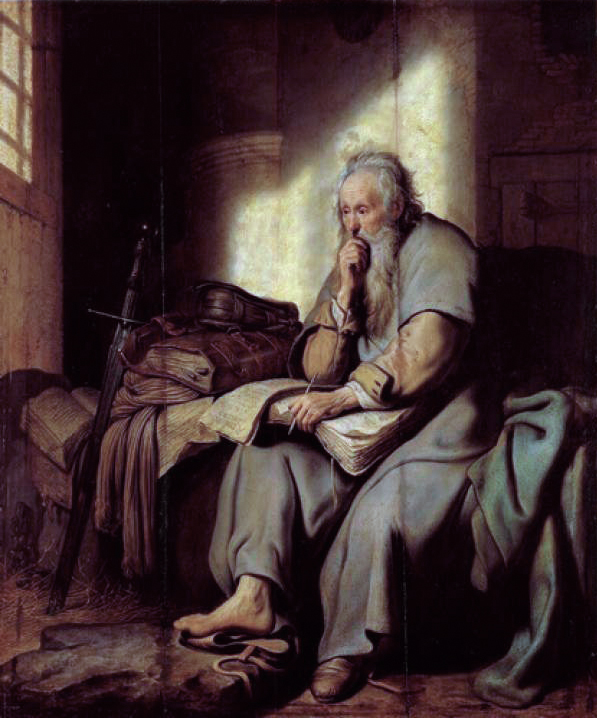(Rembrandt’s “St. Paul in Prison”, courtesy of Wikimedia Commons)
Daily Office Readings for Friday, August 16, 2019:
AM Psalm 102; PM Psalm 107:1-32
2 Samuel 15:19-37; Acts 21:37-22:16; Mark 10:46-52
Our reading in Acts today is the beginning of Paul’s testimony after his arrest, and what a testimony it is! He tells the story of his own redemption with a flare that only the one who had experienced it could tell it and be heard the way he was.
We often joke in the Episcopal Church that we Episcopalians often get a little squeamish about the “E” word–evangelism–and I would suggest that we are just as squeamish about the “T” word–testimony. Giving testimony seems almost foreign to our church minds, because individual testimony seems to fly in the face of “Decently and in good order.” Testimonies conjure up visions of tent revivals and camp meetings–maybe even a basket of snakes to handle! In our liturgies, geared to experience God in community, individual testimony seems, at first glance, an odd fit..or no fit at all.
Yet, at the same time, the stories in Acts are so often rooted in scenes of individual testimony…Stephen, just prior to his stoning, in his rendering of salvation history…the Ethiopian Eunuch, seeing no reason why he shouldn’t be baptized…and Paul, telling the story of his experience on the road to Damascus. Who we are, and how we see God in this long gray line of not just history, but our history, becomes another thread in the ever growing tapestry of the human relationship with God.
Perhaps the “fit” for understanding the power of understanding testimony lies within the piece of our rich liturgy that has been sometimes referred to as “a sacramental act in search of a theology, ever since the 1979 Prayer Book came out.” The rubrics of our confirmation rite (p. 412, BCP) describe confirmation as “a mature public affirmation” of our faith…and part of that preparation to live out that public affirmation is the power of our own faith story, what brought us to that step.
Admittedly, the word, “confirmation” often evokes mental pictures of barely-scratching-on-the-door-of-adulthood thirteen year-olds, who show up in front of the bishop in their best Sunday clothes, but confirmation is so much more than that. Making a public affirmation of our faith requires us knowing the story of our own faith journey and articulating it when needed or useful.
The power of testimony hit home for me a few years ago, when, during my formation, the very first confirmand for which I had primary responsibility for turned out to be anyone BUT a well groomed, squeaky clean teenager.
My very first confirmand was someone who didn’t use gendered pronouns for self-description; not even “they.” What I came to realize was that my confirmand had a very deep faith story, but one that could not always be accessed or shared easily, because language fails us when situations don’t always fit in nice, neat, gendered boxes. I had figured out early on that spending our time together doing the usual things we do in the catechesis of confirmands would be an exercise in spinning our wheels, so I opted for a different tack. Most of our time for catechesis would be about learning how to articulate this amazing faith story through the stories of others…personal testimonies. It would be about how to massage the limitations of language to tell the story that illustrated preparation for a mature affirmation of one’s faith.
Each week, I’d bring in a different person from our parish, each telling his or her own faith story. I had chosen people that I knew would have their own special angle on that story–I knew a snippet or two of their stories–but I had no idea how deep and mysteriously twisting those stories would be, like Celtic knots meandering along this faith tapestry. Afterwards, we would discuss how the story we just heard connected to my confirmand’s story. By the end of our time together, we both discovered quite a bit about the power of personal testimony in bringing out the intricate patterns of our communal life in the church.
When the day came for us to go to the Cathedral, the icing on the cake was watching our bishop, after telling him a little of my story of “my first confirmand”, weave a golden thread through that tapestry, by substituting my confirmand’s name for the pronouns in the words normally said when he lays hands on confirmands. We couldn’t have gotten there, to that moment, without personal testimonies–lots of them.
Whose personal testimonies weave bright threads through your spot on the tapestry of faith?
Maria Evans splits her week between being a pathologist and laboratory director in Kirksville, MO, and gratefully serving in the Episcopal Diocese of Missouri , as the Interim Pastor at Christ Episcopal Church, Rolla, MO.

